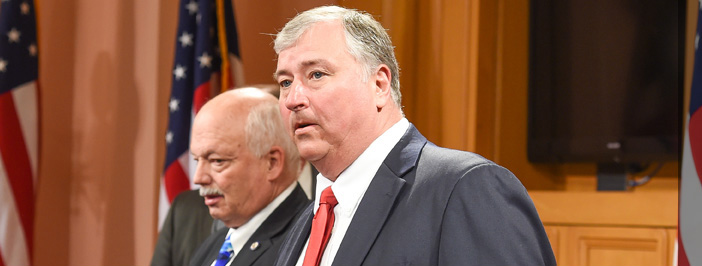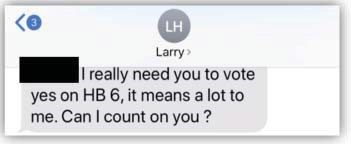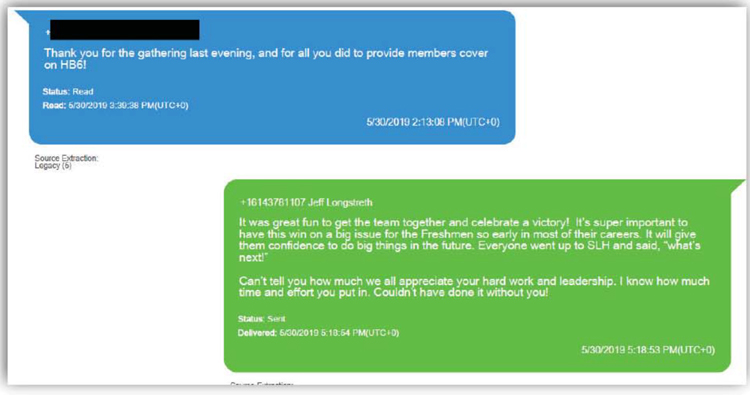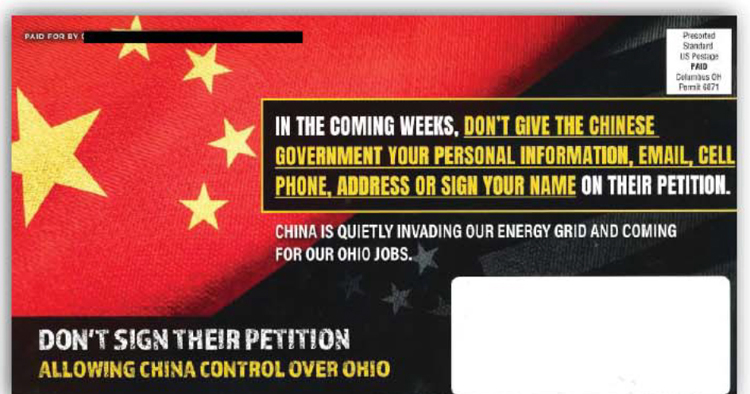The Larry Householder enterprise: Ohio’s ‘largest bribery, money-laundering scheme’
According to an FBI indictment issued in July 2020, Ohio House Speaker Larry Householder accepted more than $60 million in bribe money from FirstEnergy Corp. in exchange for a $1.3 billion public bailout.
In any other year, this probably would have been a much bigger story. But in 2020 with COVID and the Trump circus, much of it got lost in the noise. It wasn’t until I started digging into the details that I realized the full scale of corruption and how many people were involved.
The FBI charged Householder, chief political aide Jeff Longstreth, and lobbyists Matt Borges, Neil Clark, Juan Cespedes, and Generation Now with conspiracy to commit racketeering. The plot involved getting Householder and a slate of Householder candidates elected in 2018, making Householder Speaker of the Ohio House, and then using his resulting political clout to pass a $1.3 billion bailout bill for two failing FirstEnergy nuclear power plants.
David DeVillers, the U.S. attorney for the Southern District of Ohio, stated:
(It) is likely the largest bribery, money-laundering scheme ever perpetrated against the people in the state of Ohio.
How did the alleged scheme work?
According to the indictment, Householder’s enterprise had several purposes:
- To increase Householder’s power through corrupt means
- To further his political interests
- To enrich himself and the other members of the enterprise
- And to assist in passing the bailout legislation for FirstEnergy
The first part of the scheme involved getting Householder elected as speaker of the Ohio house.
The prior speaker, Cliff Rosenberger, supported Ryan Smith as his successor. However, in April 2018, Rosenberger abruptly stepped down due to an FBI inquiry. This opened up an opportunity for the primary in May. FirstEnergy moved $1 million into the Generation Now, controlled by the Householder enterprise. Householder then used this money to support 15 candidates (including himself) in the May primary. Most of the Householder-backed candidates won in the primary. All told, Generation now spent more than $1.8 million on the Spring 2018 primary races—the majority of this coming from FirstEnergy.
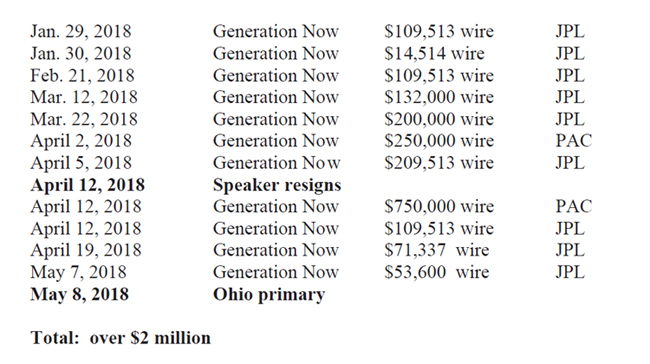
In the general election, the Householder enterprise subsequently supported these same 15 candidates plus another 6 candidates with an estimated $125,000-$150,000 per candidate. Using this metric, the enterprise spent $2.5-$3 million on the general election in 2018.
While Smith won a heated battle to be appointed interim speaker, he lost the vote for speakership to Householder in early 2019. All of the candidates who Householder supported who had won their general election contests supported Householder for speaker.
The Householder Enterprise referred to FirstEnergy as “The Bank” because it was able to fund whatever Householder needed to achieve its’ goals. As Clark stated in a recorded conversation in July 2019:
“We call FirstEnergy ‘the Bank’ because they can do, they can do, they can fund these things for 20 years if they want to … They’ve got too much money, too much power.”
The second part of the scheme involved passing the $1.3 billion bailout of FirstEnergy.
Three months into his speakership, HB 6 was introduced to save FirstEnergy’s two failing nuclear energy plants. This bill would fund the bailout through a monthly charge on every energy bill in Ohio. According to the indictment, after introduction of HB 6, FirstEnergy began increasing its payments into Generation Now for the purposes of furthering the efforts of the Householder enterprise.
In May 2009, while the controversial legislation was pending, FirstEnergy wired four payments totaling $8 million to Generation now for the purpose of running media campaigns to convince legislators to vote for the bill and “provide cover” for sponsors and ‘yes’ votes.
On May 29th, 2019, HB 6 passed the House, and after the enterprise members exerted pressure on the Senate, the legislation passed and was signed into law by Governor DeWine.
Subsequently, after the legislation was passed, a ballot initiative started up to have it repealed before it could take effect in October of 2019. In response to this ballot initiative, FirstEnergy wired over $38 million into Generation Now to defeat the ballot initiative. This money was used to purchase media buys against the initiative, to buy off signature collection firms so they wouldn’t work for the initiative, and to pay off and bribe signature collectors.
Signature collectors were offered payouts of $2,500 if they would stop working for the repeal initiative.
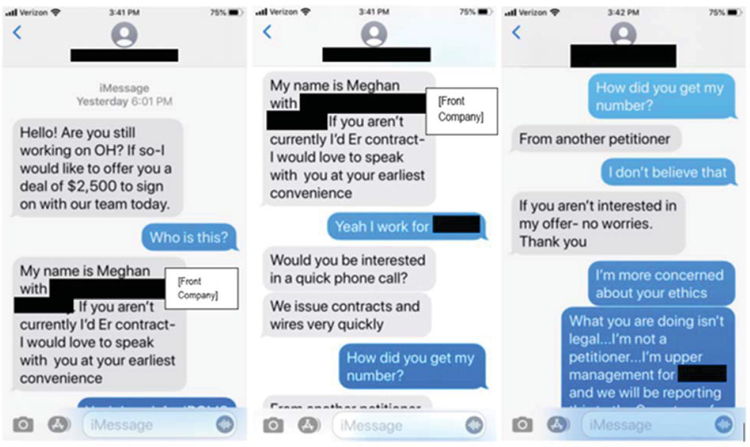
In addition, Borges paid $15,000 of Generation Now money to someone working with the ballot repeal for insider information. This money came from FirstEnergy even though Borges told the person that it was coming directly from him. The insider, upset about these bribery attempts, contacted the FBI and subsequently recorded all of his conversations with Borges, including Borges’ payment of $15,000 to him.
Personal benefits to Larry Householder and others indicted
In addition to passing HB 6 and subsequently working to defeat the ballot initiative, the Householder enterprise also used millions of dollars of FirstEnergy bribe money for personal benefit and to fund Householder’s own campaign. FirstEnergy money paid for the operating costs of the enterprise and also for Householder’s political and campaign staff.
According to the indictment, Householder also received more than $500,000 in personal benefit from the scheme. Borges, a former Ohio Republican Party chair, transferred $1.62 million to his firm out of which he paid himself about $350,000. And Longstreth, Householder’s chief political strategist, shifted more than $10 million into his firm, JPL & Associates. In addition, Longstreth received indirectly another $4.4 million that was transferred from Generation Now into another front company. In January 2020, Longstreth transferred $1 million to his personal brokerage account.
Dark money links to Governor Mike DeWine
According to a December Cincinnati Enquirer story, FirstEnergy also helped provide dark money to both Governor Mike DeWine and to his daughter Alice in her bid to become Greene County prosecutor.
This involved $20 million in donations to a group called Partners for Progress Inc. in 2019. Partners for Progress is organized as a 501(c)(4) “social welfare” nonprofit, which means it cannot spend more than half of its expenditures on political causes nor work closely with candidates and their campaigns. Such groups are often called “dark money” entities because they don’t have to disclose their donors.
Partners for Progress moved $13 million of this money to Generation Now.
The tax returns from Partners for Progress revealed that the 501(c)(4) also contributed:
- $75,000 to Protecting Ohio Inc., which paid for mailers supporting Alice DeWine’s county prosecutor campaign this year.
- $300,000 to Securing Ohio’s Future, a third-party group supporting Gov. DeWine and Lt. Gov. Jon Husted’s campaign.
Close
A DeWine spokesperson told The Enquirer that DeWine spoke with FirstEnergy officials in 2019 and asked them to support his daughter’s effort with independent expenditures.
This statement from the indictment much sums up the alleged corruption:
<FirstEnergy> entities paid Householder’s Enterprise $60,886,835.86 in secret payments over the approximately three-year period in exchange for the billion-dollar-bailout. The Enterprise concealed the payments by using a 501(c)(4) to receive the bribe money, and then transferring the payments internally to a web of related entities and accounts. The millions paid into the entity are akin to bags of cash- unlike campaign or PAC contributions, they were not regulated, not reported, not subject to public scrutiny- and the Enterprise freely spent the bribe payments to further enrich the Enterprise’s political interests and to enrich themselves.
Larry Householder lost his speakership, but in 2020 he was re-elected to the Ohio House largely because the scandal hit after the primaries and the only way to run against him was to run as a write-in candidate (almost impossible to win).
The Ohio Republican Party has taken no steps against Householder. Current House Speaker Dave Cupp has stated that they might take steps to remove Householder when he starts his new term in January 2021.
Bipartisan legislation has been introduced in the Ohio House to repeal HB 6, but so far the House hasn’t taken any action on it. Some House Republicans seem to be hoping that the scandal will blow over if they stonewall enough on any repeal.
As you’ve seen in the indictment, public pressure works; this is why the Householder enterprise spent so much money on advertisements to pressure legislators. Public pressure can also be used to remove Householder and repeal HB 6.
You can help by contacting your state legislators and asking them to:
- Remove Larry Householder
- Repeal HB 6


